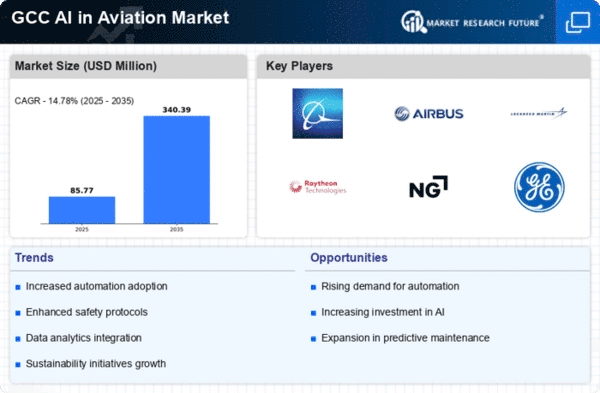Cost Reduction Initiatives
Cost efficiency remains a critical focus for airlines and aviation stakeholders, driving the AI in Aviation Market. AI technologies offer solutions that can significantly reduce operational costs through automation and optimization. For instance, predictive analytics can streamline flight operations, leading to fuel savings and reduced maintenance expenses. In the GCC, airlines are increasingly adopting AI-driven tools to enhance their financial performance. Reports indicate that airlines implementing AI solutions have achieved cost reductions of up to 20%. This trend suggests that the ai in-aviation market will continue to expand as stakeholders seek to leverage AI for financial sustainability.
Technological Advancements in AI
The rapid evolution of artificial intelligence technologies is a primary driver for the AI in Aviation Market. Innovations in machine learning, natural language processing, and computer vision are being integrated into aviation systems, enhancing operational capabilities. In the GCC, investments in AI research and development have surged, with funding reaching approximately $1.5 billion in 2025. This influx of capital is likely to accelerate the deployment of AI solutions in various aviation sectors, including air traffic management and customer service. As airlines and airports adopt these technologies, they can expect improved efficiency and reduced operational costs, which may lead to a more competitive market landscape.
Regulatory Support and Frameworks
The establishment of supportive regulatory frameworks is crucial for the growth of the AI in Aviation Market. In the GCC, governments are actively promoting the integration of AI technologies in aviation through favorable policies and guidelines. For instance, the UAE's General Civil Aviation Authority has initiated programs to facilitate the adoption of AI, aiming to enhance safety and efficiency in air travel. This regulatory backing not only encourages investment but also fosters innovation among local companies. As a result, the ai in-aviation market is likely to experience accelerated growth, with an expected CAGR of 15% over the next five years, driven by these supportive measures.
Growing Demand for Safety and Security
The increasing emphasis on safety and security in aviation is a significant driver for the AI in Aviation Market. With the rise in air travel, particularly in the GCC region, there is a heightened need for advanced safety measures. AI technologies are being utilized to enhance security protocols, such as biometric identification and threat detection systems. The market for AI-driven security solutions in aviation is projected to reach $2 billion by 2026. This growing demand for enhanced safety measures is likely to propel the adoption of AI technologies, as stakeholders seek to mitigate risks and ensure passenger safety.
Enhanced Customer Engagement Strategies
The need for improved customer engagement is a vital driver for the AI in Aviation Market. Airlines and airports in the GCC are increasingly utilizing AI to personalize passenger experiences, from booking to boarding. AI-driven chatbots and virtual assistants are being deployed to provide real-time assistance, enhancing customer satisfaction. The market for AI in customer engagement within aviation is expected to grow by 25% annually, reflecting the increasing importance of customer-centric strategies. As competition intensifies, stakeholders are likely to invest in AI technologies to differentiate their services and foster loyalty among travelers.
















